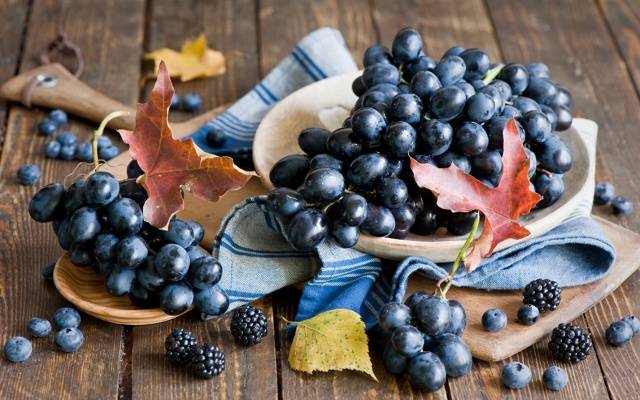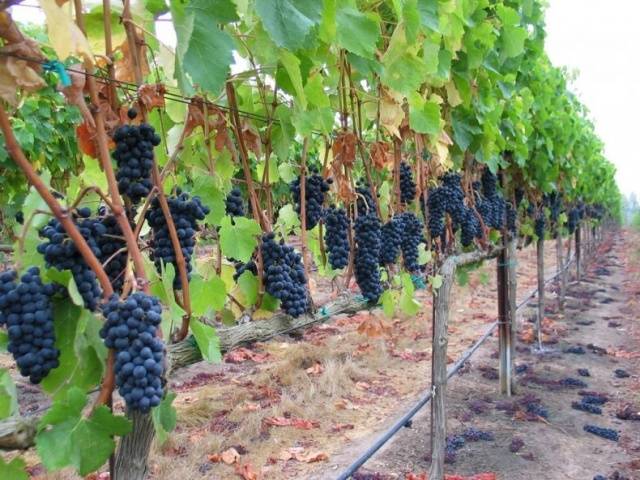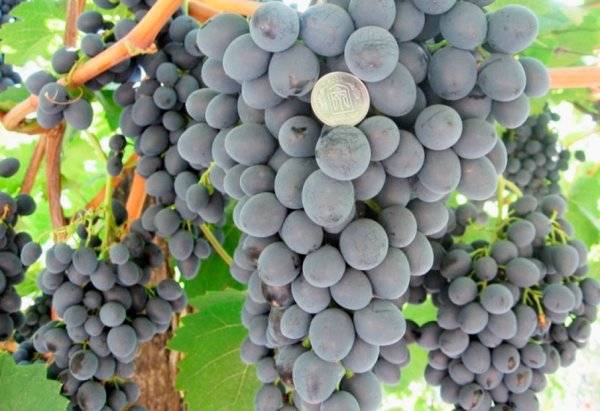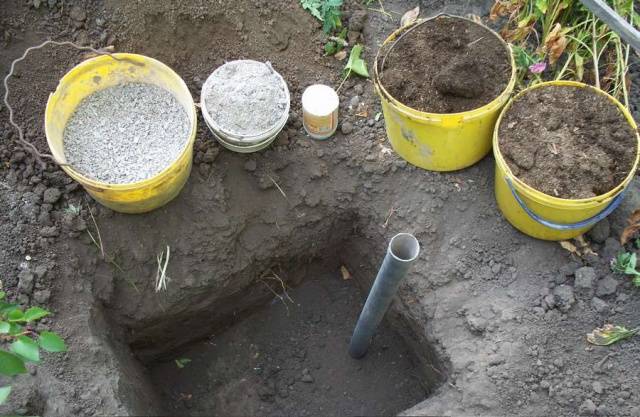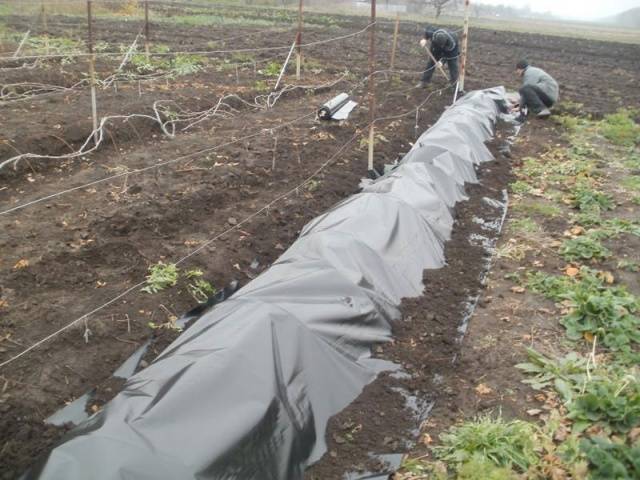Content
Unpretentious and early grape varieties are popular among gardeners. Each of them wants to feast on juicy berries as early as possible. Such varieties are less susceptible to fungal diseases. Kuban is one of the best early varieties black grapes. It appeared quite recently, but has already gained popularity. To make the idea of the Kuban grape complete, consider its description, photos and reviews of gardeners. We will learn how to plant and care for the shrub correctly.
Breeding history
The grapes of the Kuban were brought out by domestic breeders of the zonal station of winemaking and viticulture, which is located in the city of Anapa. A new variety was obtained by crossing two varieties of berries - Moldova and Cardinal.
Kuban is sometimes called early Moldova. But these are two completely different varieties that differ in many characteristics. The hybrid was successfully tested, it became possible to grow it in many regions of Russia, Ukraine and Moldova.
Description of the variety
Kuban is a table variety that produces an early harvest. Berries ripen in 115-120 days after bud break. In the southern regions, the fruits are harvested in mid-August. In the central and northern parts of Russia, grapes can be tasted closer to September.
Bushes and flowers
Kuban grape bushes are spreading and vigorous, characterized by strong branches and a trunk. They can reach from 1.5 to 2.5 meters in height. The leaves are medium in size, bright green in color, and uneven, carved edges. One bush grows from 35 to 45 shoots.
The peculiarity of this variety is small, bisexual flowers, which greatly simplifies the fertilization procedure. They are collected in inflorescences that form a panicle. The petals are yellow-green, in the form of caps. Blooming clusters bear fruit well. But during rains, the pollination process can be disrupted.
The photo shows Kuban grape bushes.
Bunches and berries
The grape clusters are large, cylindrical-conical, and of medium density. The average weight of the vine is in the range of 0.7-0.9 kg, and the maximum weight of the hand is 1.3-1.5 kg.
The berries are large, oblong, weighing from 10 to 15 grams and measuring 3x2.5 cm. Under the thin black skin there is a juicy and aromatic pulp with blue-red veins. The seeds are large, pronounced. The taste is rich, harmonious, sweet, with a hint of nutmeg and a little sourness. Tasters rate it at 8.4 points. The sugar content in grapes Kuban - 20%, acid 5-6 g / l.
Benefits
The grapes of this variety are loved by gardeners due to the following properties:
- excellent taste and decorative qualities;
- large berries and the large weight of the bunches;
- high resistance to mildew, powdery mildew and gray rot;
- early harvest;
- wasps do not attack ripe fruits;
- can be stored for a long time;
- during transportation, it does not lose its external and taste qualities;
- berries not prone to crumbling and cracking;
- 55-60% of shoots bear fruit
Kuban is an unpretentious variety that does not require special growing conditions.
disadvantages
Like any grape variety, Kuban has some disadvantages:
- low frost resistance, does not withstand temperatures below -20 aboutC, therefore, the bushes should be covered for the winter;
- berries of this variety can get sunburn, so it is not recommended to tear off the foliage above the bunches;
- pea may occur;
- so that the branches do not break and are not overloaded with berries, the bushes must be cut off;
- during prolonged rains, the pollination process can be disrupted.
High-quality care of Kuban grapes will help to avoid many problems.
Agrotechnical features
Despite the unpretentiousness of this variety, you need to take into account the peculiarities of agricultural technology. The volume of the harvest, the health of the berry bush and its resistance to diseases depend on this.
Landing dates
Spring planting of grape seedlings is carried out from April 15 to May 15, before the kidneys awaken. By this time, the soil should warm up to +10 ABOUTC, and air up to +15 ABOUTC. Before the cold weather, the grapes will have time to take root and take root.
In autumn, the Kuban can be planted from the first days of October. In this case, the air temperature should be from +5 ABOUTFrom to +15 ABOUTC. It is undesirable to delay planting, as the roots may freeze and the bush will die.
Seat selection
This grape variety is sun-loving and grows well in illuminated areas. The berry bush does not tolerate sharp cold winds and drafts, therefore it is located on the southern slopes or next to buildings. Plant not recommended for planting in lowlands and ravines, as there are most often fogs, frosts and high humidity.
Kuban grapes love fertile, loose soil. The bushes grow best on black soil. But if you fertilize the planting hole well, then you can plant the plant in any land.
Planting pit preparation
The selected area is dug up and cleaned of weeds. 1-1.5 months before planting grapes, a planting pit should be prepared.
For this:
- Dig a depression 80x80 in size and 0.8-1 meter deep.
- At the bottom, 5-8 cm of drainage from crushed stone, gravel or broken brick is poured. This layer protects the root system from high humidity.
- An irrigation pipe is installed in the pit, the end of which rises above the ground.
- The next layer is black soil mixed with humus in a ratio of 1 to 1. Its thickness is 20-30 cm.
- Pour 150-250 g of potassium fertilizer and superphosphate and a little wood ash on top, mix slightly with the soil.
- The hole is covered with a fertile layer of soil, which was removed when they began to dig the depression. The grape planting site is irrigated with water.
Landing procedure
24 hours before planting, the root system of the seedling is soaked in cold water. Rules for planting a berry bush:
- The planting pit is watered with several buckets of water.
- The seedling is lowered into the hole and its roots are straightened.
- They cover it with earth to the point of growth and tamp it. The soil layer should be 30-40 cm.
- The planted grapes are watered at the rate of 25-30 liters per bush.
- Mulch with straw, sawdust or twigs.
Some gardeners dig a ditch around the bush to drain the water.
Care features
An early ripe hybrid Kuban will regularly bear fruit on any land, if you provide it with proper care. It includes: watering, feeding, pruning a bush and preventive treatment of diseases.
Pruning
In the spring, cut off weak shoots and dry branches of grapes, remove excess buds. After pruning, 35-40 eyes and 30-35 green shoots should remain on the shrub. In the summer, barren stepchildren are cut off, which form in the leaf axils. In the fall, after the foliage has fallen, the main part of the branches is pruned and the bush is covered for the winter.
Top dressing
To increase yields, Kuban grapes are fed organic and mineral fertilizers. The procedure is carried out three times a year:
- in early spring, before bud break, a complex fertilizer is applied;
- before ripening - superphosphate and potassium supplements;
- after flowering - potash fertilizers.
In the fall, once every three years, slurry is used at the rate of 1 kg / 1m2.
Watering
Watering the Kuban grapes is rare, but abundant. Depending on the composition of the soil and weather, it is advisable to irrigate every 25-30 days. In summer, watering is carried out more often, once every 7-14 days, in the evening or morning. In August, during the ripening of berries, watering is removed. AND in autumn they carry out moisture-charging humidification.
One bush consumes 5-20 liters of water. It should be warm and well-kept.
Disease prevention
Kuban grape variety resistant to gray mold and mildewbut may be affected by other common diseases. Therefore, carefully look after the berry bushes: remove weeds, prune.
They also carry out preventive spraying of grapes with special means:
- before flowering;
- after flowering;
- after harvest.
Bordeaux mixture, copper and iron vitriol are used for processing. The most effective against pests are Fitoferm, Fozalon, Iskra.
Gardeners reviews
Conclusion
The Kuban grape is a favorite variety of many summer residents and gardeners. It attracts with its unpretentiousness, decorative qualities, large berries and rich taste. The variety is in demand among buyers, so it is quickly sold out on the market. Kuban is suitable for both personal consumption and sale.
